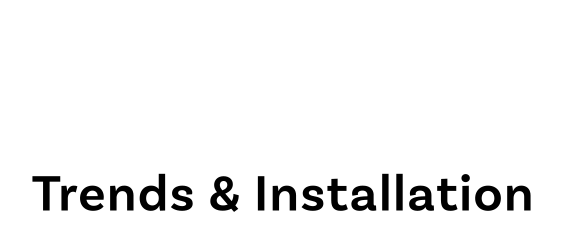By Mark Bischoff
Commercial
Talent Wars in the Flooring Industry: How to Recruit and Retain Gen Z Talent
Photo: Cecilie_Arcurs/iStock/Getty Images Plus via Getty Images.
According to Eric Lamarre, senior partner at consulting firm McKinsey Boston, "One of the biggest challenges companies face in recruiting and retaining talent is the perception that traditional industries are less innovative and dynamic than other sectors. To overcome this, companies need to emphasize the unique opportunities and benefits that their industries offer, such as stability, long-term career growth, and the potential to work on meaningful projects that have a significant impact on society."
Following the advice of McKinsey, our industry must be well prepared to activate the imagination of a Gen Z recruit with a vision of stability, long-term career growth, and the potential to work on meaningful projects. These characteristics Gen Z workers are looking for can be found in our Starnet membership, heavily populated by multi-generational companies that enable all other businesses in their communities to thrive through the built environment.
Contract Flooring Perspectives
At every live event, our Starnet members lament the challenges of attracting early-career talent to our traditional industry. Some of them have allowed their organic growth to be capped by their frustration with the talent war. Others have adapted and succeeded. As more of our membership moves to expand geographic coverage, they are establishing various branch locations. In the process, they have become more sophisticated in, organizing formal recruiting and onboarding programs to support scaled talent acquisition. Our professional flooring contractors are competing inside the construction industry for good people with other sophisticated trade contractors. In addition, the standard for talent retention and attraction is being set above that by regional and national general contractors with well-established brand stories, comprehensive packages of incentives, formal onboarding programs, and mapped career paths that appeal to Gen Z recruits.
Traditional methods of recruiting and onboarding have been a reasonable solution in the past, but the demands of a modern professional flooring contracting firm are no longer traditional. Major trends affect our Starnet members in their talent retention and recruiting efforts, including increased expectations to deliver results faster, a shift in contextual knowledge and skill requirements for both leaders and employees, and the need to increase personal flexibility in all sides of workplace responsibilities.
Paths to Success
To recruit successfully, Starnet member companies have adjusted their messaging and onboarding efforts. Our professional flooring contractors are highlighting the innovation and advancements within our industry, as well as providing written career paths and opportunities for growth. Many are clearly defining their mission, core values, and defining important roles in their businesses with precise job descriptions and benchmarked expectations. This has made a difference in member success with early career recruiting.
Gen Z workers require some effort by employers to lay out long-term planning models that satisfy the “road map” generation. Members report that early career associates expect rapid career advancement. A leader must be prepared to outline the benchmarks that would qualify for that advancement, short-term and long-term. Talent has not responded well to obscure descriptions of advancement, such as, “We’ll know when you are ready to take the next step.” That response is no longer a workable option for Gen Z talent, especially when basic benchmarks for advancement can be generated by a random AI resource in seconds.
Proper career roadmaps are developed from effective onboarding plans. Once talent is secured, the first few months are critical to cement the passion of new hires. Onboarding plans should be divided into distinct blocks of time, each with clear goals that define when it is time to move on to the next phase. The timeline of each role will differ but assigning horizons and providing feedback from leadership can help clarify what you are trying to achieve for the associate and the company.
For example, the first week for a sales role may include covering and testing for the following:
- Complete all mandatory compliance training and certifications
- Deep dive into company products, services, and target markets
- Introduction to the sales process, pipeline management, and lead generation strategies
- Review case studies and success stories of past projects
- Attend a team meeting and see current projects in progress
- Begin shadowing experienced Business Development team members on client calls and meetings
- Learn about the company's pricing strategies and financial goals
- Familiarize with key industry terminology and commercial flooring materials
- Schedule one-on-one meetings with department heads to understand their roles and how they interact with business development
- Complete first-week feedback session with manager and mentor
In the first three months, the expectations for a sales role may include:
- Develop a 90-day action plan outlining key learning objectives and goals
- Begin actively participating in client meetings and sales calls
- Start managing a small portfolio of accounts under supervision
- Attend trade shows, webinars, or industry events relevant to commercial flooring
- Analyze and report on market trends and potential opportunities for growth
- Engage in continuous learning through online courses or workshops specific to sales and business development
- Receive feedback from mentor and team on performance and areas for improvement
- Take part in role-playing exercises to improve negotiation and presentation skills
- Collaborate on a small project or initiative to contribute to the team’s goals
- Schedule a formal performance review with the manager to discuss achievements, challenges, and next steps
Resources and Impact
As a service to the membership, Starnet has partnered McSweeney Group, a recruiting and contract staffing agency focused on the commercial interiors industry, to support members in their search for talent. The services they provide are far more effective and focused on the needs of our flooring contractors than online hiring platforms. The professional staffers at the McSweeney Group often advocate on behalf of our flooring industry for interested talent. They can also help our leaders’ position opportunities against similar roles in contract furniture or lighting. Marilyn McSweeney, founder and CEO has shared with our Starnet members advice to capture and receive top talent with a clear mission, vision, and career paths in a company.
Gen Z talent expects a road map for their career, or they will find one in another company. The roadmaps should be compelling when measured against alternatives in technology, retailing, or manufacturing industries. Our amazing entrepreneurs should have no problem competing for the best people if we continue to put in the work as suggested by the MBA intelligentsia. We can also take counsel from industry veterans, like Marilyn McSweeney, principal at the executive recruitment firm The McSweeney Group, who knows what it takes to succeed in attracting the best talent for contract interiors.
The concept of a career roadmap is somewhat new to our traditional industry, but employers prepared to provide the path will win the war for talent. In the simplest terms, a road map is a document that shows a company strategy and charts the course for the team members to contribute. This keeps all the stakeholders on the same page. At a basic level, a few AI prompts can easily provide a framework to build around that includes the unique culture or capabilities of a contract flooring company.


